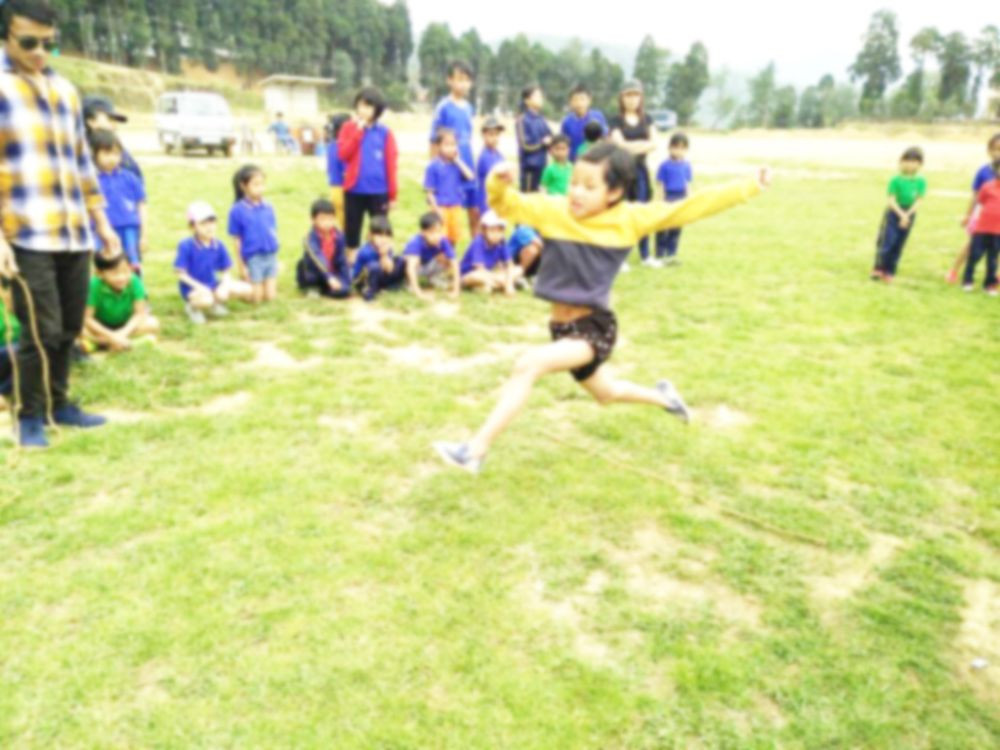Children taking part in a sports event organized by Jo Foundation-an Inclusive Proceeding School in Kohima. (Photo Courtesy: jofoundation.com| For representational purpose only)

Workshop on inclusive education discusses challenges and way forward
"…There may be no teacher trained in sign language interpretation as of now under NBSE…
-NBSE Chairperson
Morung Express News
Kohima | October 26
The scenario of inclusive education in Nagaland is still in a very poor state, as is the awareness among the general populace towards promoting the rights and wellbeing of persons with disabilities in all spheres of the society.
On October 26, Principal Director of School Education, Shanavas C noted with regret that, “Though everyone talks about inclusive education, it happens only on paper.”
Speaking at the one-day workshop on ‘Inclusive Education – a step into inclusion’ organised by the office of the State Commissioner for Persons with Disabilities in collaboration with Bumblebee Inclusive School on October 26 at Hotel Japfü, the Principal Director highlighted several challenges being faced in implementing inclusive education in the state.
Owing to the people’s outlook towards persons with disability (PwDs), Shanavas was of the view that the PwDs and their family members lack the confidence to be exposed. To this end, he maintained that there is a need for lots of interventions with convergence of collective responsibility to push and build confidence among children with disabilities.
It was also mentioned that children of rural areas remain unreached as special schools are mainly concentrated in urban areas.
He also observed that the only time when PwDs are mentioned is during elections when the Election Commission directs to collect data of PwDs and to build ramps in the polling stations.
Citing lack of data as a major challenge and hindrance to plan welfare activities for children with disabilities, the Principal Director assured that the Educational Management and Information System (EMIS) would be strengthened to collect proper data by encouraging, motivating children and people with special needs to fight for their rights.
‘Cannot continue making education of children with disabilities an afterthought’
“We have to be brutally honest and acknowledge that disability in general was a totally neglected sector for the past many years. All matters concerning children with disabilities, including education, was also completely neglected,” stated Diethono Nakhro, State Disability Commissioner.
One of the biggest challenges with children and persons with disabilities, she stated, is the lack of data with lack of any proper information on how many there are, how many are out of school and how many have assistive technologies to aid their education etc.
“As they continue to be the ‘uncounted’ section of society,” Nakhro stressed the need for change, adding that “We cannot allow this situation to continue – and all concerned departments and organisations, stakeholders need to come together to make the change happen.”
Emphasising on the proper implementation of the new National Education Policy wherein equity and inclusion is at the heart of the policy, Nakhro asserted that, “Inclusion has to be on the table as we discuss and plan the overhauling of the education system and inclusive education specialists have to be at the table to give their valuable inputs. We cannot continue making the education of our children with disabilities an afterthought.”
“Without putting the mechanisms in place, inclusive education will just remain on paper while our children with disabilities continue to be ignored and excluded from our education system – left behind like they do not matter,” she further stated.
Some challenges for NBSE
Highlighting in brief some measures being taken by Nagaland Board of School Education (NBSE) to facilitate Children with Special Needs (CWSN) at the HSLC & HSSLC, NBSE Chairperson Asono Sekhose admitted that the school education could have done much better in the past.
She informed that during the year 2020, there were 12 CWSN in HSLC and three in HSSLC while there were 13 (HSLC) and two (HSSLC) CWSN in the 2021 board exam.
Mentioning some challenges being faced by the NBSE, Sekhose said there is a lack of baseline survey and building of schools and community support system to take care of the different needs of the children.
As inclusiveness from the point of disabilities will be for a limited population of students, she pointed out that making the textbooks inclusive is a big challenge, and also has implications for costing.
She also admitted that the state does not have the required trained teachers, and that there may be no teacher trained in sign language interpretation as of now, in any of the educational institutions under NBSE.
Sekhose doubted whether the state is equipped to develop Braille learning materials with tactile images, diagrams and illustrations and developing of digital learning materials.
Suggesting some measures for the way forward, Sekhose implied the need towards restructuring of the role of textbooks, develop variety of learning materials following UDL and digitised learning materials, consideration for fee relaxation in the board examinations for CWSN in the coming years, corresponding change in assessment and evaluation, training of teachers and financial support.
Vice principal, Chandmari Hr Sec School, Nzabeni Tsopoe; Clinical Psychologist, The Cloud Room, Themmungla Raman and Special Educator, Bumblebee Inclusive School, Kopele Tepa as resource persons, spoke on various topics during the workshop.






